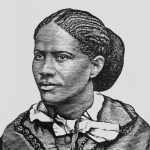Do you blame me that I loved him?
If when standing all alone
I cried for bread a careless world
Pressed to my lips a stone.
Do you blame me that I loved him,
That my heart beat glad and free,
When he told me in the sweetest tones
He loved but only me?
Can you blame me that I did not see
Beneath his burning kiss
The serpent’s wiles, nor even hear
The deadly adder hiss?
Can you blame me that my heart grew cold
That the tempted, tempter turned;
When he was feted and caressed
And I was coldly spurned?
Would you blame him, when you draw from me
Your dainty robes aside,
If he with gilded baits should claim
Your fairest as his bride?
Would you blame the world if it should press
On him a civic crown;
And see me struggling in the depth
Then harshly press me down?
Crime has no sex and yet to-day
I wear the brand of shame;
Whilst he amid the gay and proud
Still bears an honored name.
Can you blame me if I’ve learned to think
Your hate of vice a sham,
When you so coldly crushed me down
And then excused the man?
Would you blame me if to-morrow
The coroner should say,
A wretched girl, outcast, forlorn,
Has thrown her life away?
Yes, blame me for my downward course,
But oh! remember well,
Within your homes you press the hand
That led me down to hell.
I’m glad God’s ways are not our ways,
He does not see as man,
Within His love I know there’s room
For those whom others ban.
I think before His great white throne,
His throne of spotless light,
That whited sepulchres shall wear
The hue of endless night.
That I who fell, and he who sinned,
Shall reap as we have sown;
That each the burden of his loss
Must bear and bear alone.
No golden weights can turn the scale
Of justice in His sight;
And what is wrong in woman’s life
In man’s cannot be right.


















Comment form: